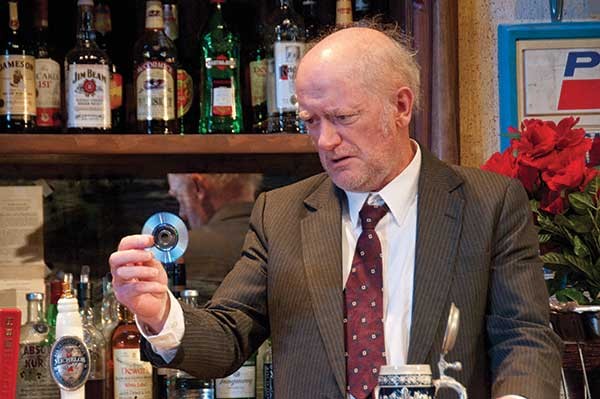
There was a time when alcoholism wasn't necessarily an ism. In the late 19th and early 20th centuries, the abuse of alcohol was viewed primarily as a social ill, an attitude that gave way to Prohibition and the temperance movements of the era. Addiction was regarded as a moral failing, not a sickness with a prospective remedy. Becoming sober was a lone journey back to virtue that was often unsuccessful. This month, the Shadowland Theatre presents "Bill W. and Dr. Bob," the story of William Wilson and Dr. Robert Smith—the founders of Alcoholics Anonymous who offered an alternative to this doomed narrative of the moral pit of dipsomania.
Janet Surrey and Samuel Shem, two psychiatrists working in recovery, decided 20 years ago to research the two men and create a theatrical portrayal of their lives. Their aim is similar to Brendan Burke's, the play's director and Shadowland's artistic director. He says, "Part of our mission is to be socially relevant. This play is an important story that is pertinent to people's lives—it's a play that will have people talking about alcoholism after it ends."
Bill W. and Dr. Bob find themselves hopelessly down-and-out, with nothing but their own resolve to rescue them from their habit. Wilson, once a successful stockbroker, loses everything in the Crash of 1929. Though during this time finding a job was difficult for most Americans, his situation was worsened by his perpetual drunkenness. He sets out to sober up, and heads to Akron, Ohio, to look for work. "He has the temptation [to drink] one night at his hotel," explains Burke. "He reaches out to a woman named Henrietta from the Oxford Group [a precursor to AA] and says, 'I need to speak to another drunk.' She puts him in touch with Dr. Bob."
A surgeon who performs procedures drunkenly or, at the very least, hung over, Smith might appear to be more of a detriment to Bill W. than a source of support—the blind leading the blind. "This was the first time that this idea came about," notes Burke. The revolutionary notion? Addicts can actually help one another. "There's a moment when Bill W. tells Dr. Bob that his doctor called his alcoholism a disease—he tells him it's something with progression, symptoms, and potentially a cure. Dr. Bob had never seen that perspective before, and it definitely represents a turning point for his character," Burke says.
The duo guide each other through what becomes AA's 12-step program, soon realizing that they can replicate it to help others. However, alcoholism's effects aren't exclusive to the drinker—both Bill W.'s and Dr. Bob's wives suffer the consequences of their husbands' sickness. "Bill W. and his wife, Lois, aren't able to bear children so they try to adopt a child. But they're ultimately denied permission to do that because of his disease," says Burke. Lois and Dr. Bob's wife, Anne, are the only other two characters in the play. They add another layer to the show's plot as they use their marital difficulties as the impetus for Al-Anon, a support group for the friends and families of alcoholics.
"Most people, one way or another, have had their lives impacted by alcohol," says Burke. "For me, theater has to have a 3-D impact. It has to be accessible to people who watch it. This is a universal story of recovering, healing—and it's a great play."
"Bill W. and Dr. Bob" hits the stage at Shadowland Theatre in Ellenville from September 13 to 29, with Galway McCullough as Bill W. and Steve Brady taking on the role of Dr. Bob. Ticket prices start at $30. (845) 647-5511; Shadowlandtheatre.org.












